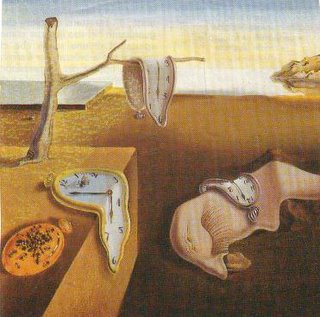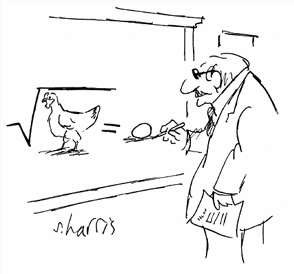
The part of philosophy called Epistemology is concerned with knowledge. What is knowledge? When can we say that we know something? Philosophers since ancient times have been pondering these sorts of questions.
In the post on
Descartes, we saw that the only thing that we could be sure of knowing was that we had a mind. Descartes discovered this by
deductive reasoning. Deducting reasoning, when correct, is absolute. The following argument is an example of deductive reasoning:
(1) Bachellors are single, middle-aged men.
(2) Bob is a single, middle-aged man.
(3) Therefore, Bob is a bachellor.
We deduced from the fact that Bob was a single, middle-aged man, that he must be a bachellor. Bishop George Berkely(1685 - 1753) used similar reasoning to show that the world didn't exist:
(1) We percieve ordinary objects (mountains, houses, etc.)
(2) We percieve only ideas
(3) Therefore, ordinary objects are ideas
That is, what we see of this world is only in our minds - it isn't really there. Descartes also showed that we couldn't be positive about physical reality.
The problem is, when we want to show that what we see is real, we have to use
abductive arguments. Abductive arguments are arguments to the best explanation:
(1) Things fall downwards
(2) The world looks flat
(3) Therefore, the world is flat
As you can see, abductive arguments can sometimes be wrong. We don't have the certainty that comes with deductive reasoning. But, nevertheless, there are good abductive arguments:
(1) Both you and I percieve a red chair
(2) Therefore, there is a red chair before us, causing us to perceive it (rather than it existing only in our minds)
So now the challenge is to come up with a theory which accurately describes how we can
know that there is a red chair before us. We come up with conditions that we need to satisfy. These were the conditions that were stated by the ancients:
If
p is any statement (eg. there is a red chair before us), then we know that
p only
when:
1.
p is
true2
. p is justified
3. we believe that
pThese three conditions were widely accepted to be sufficient for having knowledge. However, it was only forty years ago that Edmund Gettier found a serious problem with it. He asks us to imagine that a person, let's call him Bob, who wants to know the time. It is 10:00. Bob looks at the clock and it says that it is 10:00. Naturally, he believes that it is 10:00. So Bob has a true, justified belief; according to the above theory, he has knowledge.
But let us also imagine that the clock had stopped, and it was only by sheer chance that it had shown the right time. Does Bob
know that it is 10:00? Intuitively, it would seem that he did not: if the clock had shown that it was 10:30, then he would have thought that it was 10:30. So the classical theory is not an accurate theory of knowledge. For decades now, epistemologists have been trying to successfully overcome the problem of Gettier clocks.
Further Reading: - Edmund, L. G., 1963, "Is Justified True Belief Knowledge?", Analysis Vol. 23, pp. 121 - 23
 Before reading this post, it might help going through the article on irrational numbers, if the reader is not familiar with them already. Irrational numbers are important to understand when talking about circles. This is because of the irrational number pi (3.1415....). Pi defines the relationship between a circle's radius and it's circumference and area. A circle has a circumference of length pi x diameter, and an area of pi x (radius squared), so all circles have a circumference and an area which is irrational.
Before reading this post, it might help going through the article on irrational numbers, if the reader is not familiar with them already. Irrational numbers are important to understand when talking about circles. This is because of the irrational number pi (3.1415....). Pi defines the relationship between a circle's radius and it's circumference and area. A circle has a circumference of length pi x diameter, and an area of pi x (radius squared), so all circles have a circumference and an area which is irrational.


